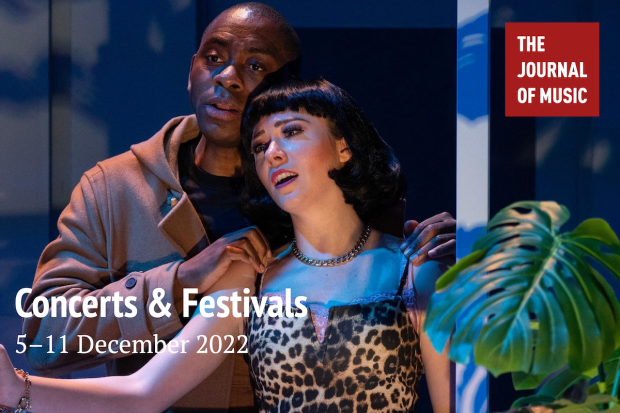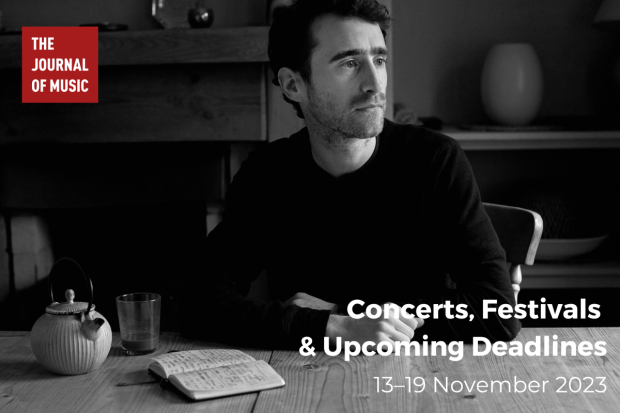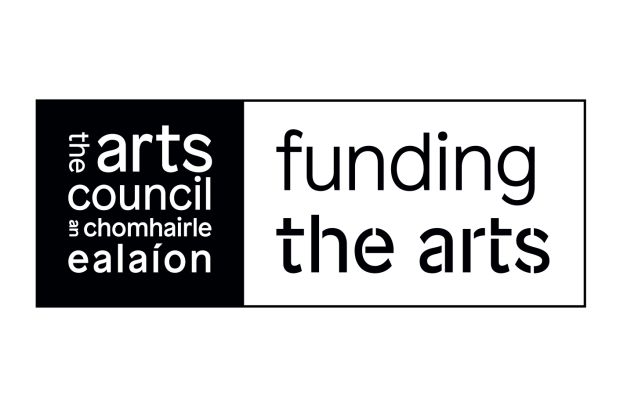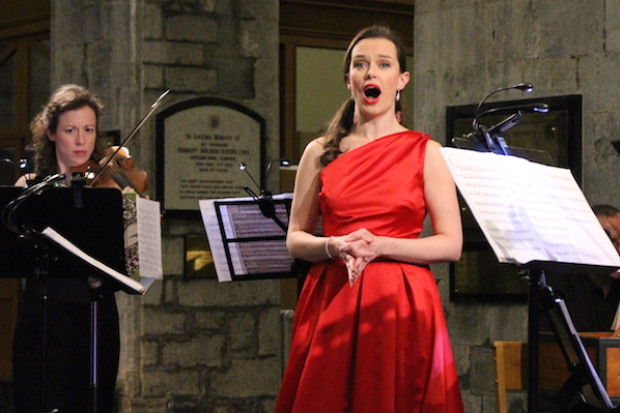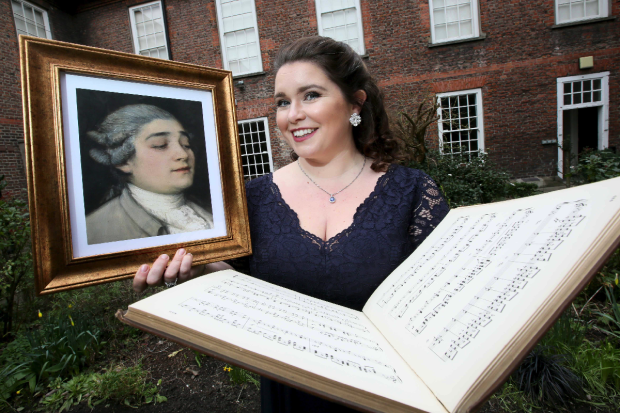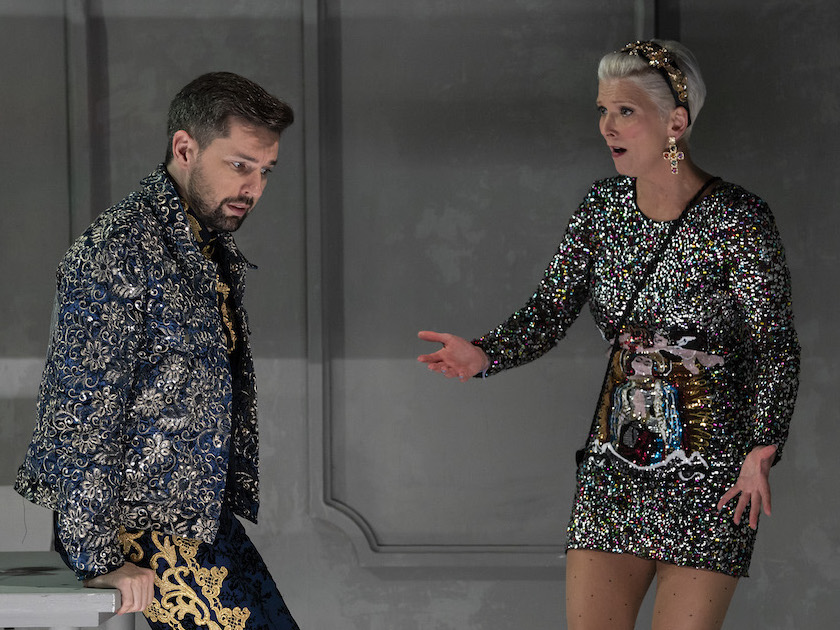
Russell Harcourt and Emma Morwood in Griselda (Photo: Patrick Redmond)
There Are No Winners
The first elements of set design that you notice in Irish National Opera’s production of Griselda (Town Hall Theatre, Galway, 12 Oct.) are the eight screens stacked on top of a guard booth to the right of the stage. A laptop and more screens sit inside the booth; it is clearly a centre of acute observation. Centre stage is a two-floor setting; above is smart, even salubrious, with white walls, a long table, glasses and bottled water; below is functional: a plywood structure, an emergency exit sign and scaffolding. It’s a tale of two worlds: privilege and power, vulnerability and abuse.
The screens to the right light up with coverage of a political protest. What does it say about our age that I have to run through various demonstrations in my mind to realise which one it is? Climate protestors? Hong Kong? Brexit prorogation of parliament? No, it’s the gilet jaunes – the anti-inequality protest in France which began less than a year ago. How many news cycles ago is that?
In Vivaldi’s Griselda, a king is under pressure, not because of social inequality, but because he has made a shepherdess his queen and his people believe she is below him. Director Tom Creed’s creative approach was to present this background in a Black Mirror type scenario at the beginning: the eight screens turn into to a single live broadcast. A crowned Gualtiero (Jorge Navarro Colorado) sits beside his queen, Griselda (Katie Bray), with one of his facilitating friends Corrado (Raphaela Mangan) off camera. Gualtiero tells his public, and indirectly, Griselda, live on TV that she’s no longer queen and that he is going to marry another woman, younger and more suitable. Shell-shocked but dutiful, and conscious of the cameras, Griselda takes off her crown, stands up, and leaves.
The fall-out from this opening provides a complex but colourful plot, involving kidnappings, struggles for status, love pursuits, and surprising family discoveries. The music dashes along, Vivaldi’s writing for strings inventive, filling moments with flourishes on violins. A large lute played by Alex McCartney provides extra 1700s texture. This was the first time any opera by the Four Seasons composer was performed in Ireland. INO’s Fergus Sheil found his way to it through Cecilia Bartoli’s recordings, which are riveting because the arias are so difficult. Several times in Griselda, you find yourself moving forward in your seat as the singers tackle long runs of semi-quavers and wide leaps, all the while throwing themselves into the drama of the scene, sometimes singing under a table or engaged in sexual harassment. Griselda has a vivacious momentum that carries the singers and audience with it. With a cast of just six, and Peter Whelan conducting a 10-piece Irish Baroque Orchestra, Creed’s Griselda is tightly knit.
But from one brutish relationship, Griselda finds herself in another. The security guard / knight Ottone (Sinéad O’Kelly) watches her on CCTV and is in love with the now ex-queen. But Ottone hopelessly and repeatedly misreads the situation, professing her undying love one moment, only to pull out a gun and threaten Griselda if it is not reciprocated. At one stage, Ottone threatens to kill Griselda’s recently born child, but the protagonist goads her to do it. Bray’s steely portrayal of the queen is one of the most intriguing aspects of the production. Tough and scrappy, in the pugilistic sense, the audience award winner at the BBC Cardiff Singer of the World competition slices through the Vivaldian vocal runs, such as in ‘Ho il cor gia lacero’, a true expression of the lead character’s rage and frustration.
Timing
O’Kelly’s Ottone is key to the smooth running of the plot however. A dangerous and twisted character, she nonetheless regularly drew laughs from the crowd with her timing. She also had two very big arias, including the frightening ‘Dopo ‘un’orrida procellla’, which she completely opens herself up to and which produced spontaneous applause from the Galway audience.
When the king’s new bride, Costanza (Emma Morwood), turns up, accompanied by her boyfriend, Roberto (Russell Harcourt), it’s like they have just come back from the All Together Now festival, comically pulling suitcases on wheels, she in a short sequinned dress, he in colourful jacket, covered in flowers and spirals. Costanza is young and confused and when the king says the boyfriend can stay it leaves her even more perplexed. Morwood, along with O’Kelly, has one of the most challenging arias of the work, ‘Agitata da due venti’, a gripping expression of her tortured mind. These are da capo arias and there was a satisfying sense in hearing the singers tackle them with even more gusto the second time around. Her finest moment, however, was in ‘Ombre, vane’, when Roberto’s continued love for her leaves her tormented. It is a perfect baroque showcase with a walking rhythm, Morwood free to sing around the balanced chords created by the orchestra under Whelan. Harcourt was an excellent partner for Costanza, his falsetto bringing added intensity to every scene he was involved in.
Griselda, now in grey tracksuit, ends up sleeping rough, but Costanza stumbles across her and the two feel a strange affinity. The new queen starts to help the former queen find a life again. In productions like Griselda, INO, still only in its second season, is doing what it promised it would: making opera relevant for our times and reaching out to new audiences. It certainly achieved the former, although even in a sold-out Town Hall Theatre in Galway you will not see many younger faces at opera and classical music concerts. With Griselda, there is a story for this generation, probably the most switched on politically since the 60s.
At the end, following a final twist which leaves her supposedly triumphant, the king (Colorado’s portrayal carried his contradictions well) looks at Griselda as if she should be grateful. But her face is strangely blank, empty, emotionless. We realise the toll of what this person has been through. We are left to consider those formidable women currently in the public eye who receive endless abuse, from Greta Thunberg and Alexandria Ocasio-Cortez to Gina Miller, and others who are regularly humiliated by their powerful spouses, and we wonder how it has come to this in 2019, and why we do nothing to stop it. In a race to the bottom there are no winners. Is that what we, like Griselda, will find out?
Griselda continues tonight (17 Oct.) at the Hawk’s Well Theatre in Sligo, then Solstice Arts Centre, Navan (19th), Watergate Theatre, Kilkenny (22nd), Lime Tree Theatre, Limerick (24th), and Pavilion Theatre, Dún Laoghaire (26th and 27th – sold out). For further information and booking, visit www.irishnationalopera.ie.
Published on 17 October 2019
Toner Quinn is Editor of the Journal of Music. His new book, What Ireland Can Teach the World About Music, is available here. Toner will be giving a lecture exploring some of the ideas in the book on Saturday 11 May 2024 at 3pm at Farmleigh House in Dublin. For booking, visit https://bit.ly/3x2yCL8.










